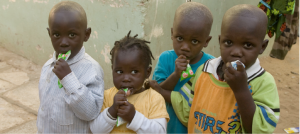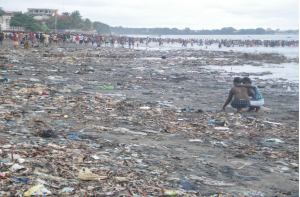
The industrial food complex is an extremely competitive industry and companies that don’t adapt and look for new markets are likely to lose margins and lose out to their competition. (After all corporations have a fiduciary duty to maintain growth). To be competitive, irregardless of local livelihoods and environmental concerns, companies move internationally to gain an edge. For instance, “globalization of the dairy industry is exerting pressures on both domestic-oriented dairy industries and international market “players” to adapt to changing market relationships.” As a result of lax international business laws and limited or non-existent local regulation, “international dairy trade has often been called a dumping ground for unwanted surplus commodities. However, the dairy trade is now increasingly driven by demands from developing-country consumers wanting to upgrade diets.” Thus, with the insatiable drive to spread profits and finding new markets we see increasingly foreign products such as General Mills’ Yoplait or France’s Danone further afield in places like West Africa. Yet, the market growth narrative applauds diversifying the diet and increasing health options for people in these emerging markets without considering what local economies these products displace and also very crucially how all this incoming plastic packing product will be disposed. Waste disposal is easily ignored in developed countries where waste disposal and recycling operations make everything discarded and unwanted ‘invisible’; however, countries in the global south predominantly lack waste management operations, and environmental laws “are put in force very late or taken without implementing decree at all.” As a result, throw-away packaging such as the Yoplait single-serve sized plastic ‘sachets’ – seen as affordable, healthy, new option in dairy for the African consumer – undeniably end up as mounting trash on the streets or in waterways.
Plastics have become the all pervasive miracle and menace of modern life. Although the feasibility of plastic bag yoghurts brings the Yoplait/Danone/(insert multination food corp name here) brand to a whole new range of consumers desiring quality, healthy and consistent dairy products, the company does itself a disservice by overlooking the negative social impact of increased trash in an already un-sustainable environment, and the negative publicity of Yoplait brand bags littering the streets. Specifically, plastics accumulate on the streets, and become breeding grounds for mosquitoes, especially during the rainy season when more water accumulates. Here’s an illustration of the irony of business practices that do not take a systematic approach to understanding overall social impact: it is a great service to nourish a child, but if they play in the street and are bitten by a malaria-infected mosquito that is living in the plastic garbage piles of product X, and the child dies, then what good does an affordable dairy product do? In another illustrative example of the negative feedback loops of this plastic waste cycle, accumulated trash on the street is often torched – a carry over from waste streams of less than 50 years ago that were only comprised of organic materials – but burning plastic is a serious health and respiratory hazard, and dioxins are a known cause of cancer. In a normal day in any given West African city, one can see kids walking around barefoot over garbage material, not to mention chickens, goats, cows, and other animals people rely on for food and labor. Moreover, the vast majority of African nations are challenged by growing water scarcity and accelerating soil erosion. Trash further degrades soil and can pollute the scarce, valuable waterways used for fishing, washing, and drinking. As a result, trash improperly dealt with is not only a hazard for the individual consumer, but the whole community. This is what happens when the culture of brash, profit-driven individualism clashes with traditional communities. The profits are minimal when we consider the real values of community vitality and environmental resilience .

[Children play on a plastic-ridden beach, Conakry, Guinea. No child should be subjected to such a wasteland. Ecological violence and social violence are two sides of the same coin. We cannot expect future peaceful generations when children are raised within contexts of ecological degradation and divide.]
